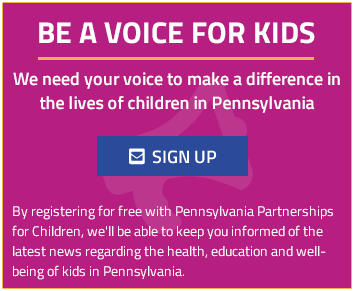PA Early Intervention programs vital for child development
A new study highlights the importance of Pennsylvania’s Early Intervention program and its services for infants and toddlers at risk of developmental delays. Kari King, president and CEO of Pennsylvania Partnerships for Children, said there are two Early Intervention programs: “Part B” for preschoolers, ages 3 to 5, and her group advocates for “Part C,” which supports […]
Reports of child abuse and neglect in Pennsylvania are rising after dropping during the pandemic, data shows
After a decline during the pandemic, reports of child abuse and neglect in Pennsylvania are on the rise again — though not reaching pre-pandemic levels yet. For its latest report, Pennsylvania Partnerships for Children, an advocacy group, dug into five years of data, from 2018 to 2023, to identify trends in how families move through […]












PAP4Children Follow 9,827 2,617
Pennsylvania Partnerships for Children is dedicated to improving the well-being of PA's 2.6 million kids. We're independent, non-partisan and non-profit.
And just like that, it's #FastFactFriday! This week's focus - Early Care and Education https://ow.ly/n53S50RjYMX
Don't miss out on hearing news like this first! Sign up for our #ppcnewsletter and stay up-to-date with the latest news. It's the only way to get the must-know info from your favorite data squad. https://ow.ly/BB2T50Refim
Unmet basic needs, like lack of access to nutritious food and stable housing, can affect children's development. Learn more about connecting families to vital resources with the Conversation Guides. #ChildAbusePreventionMonth #ThrivingFamilies
https://www.childwelfare.gov/resources/20232024-preventionresource-guide/
It's everyone's favorite day of the week, PPC #FastFactFriday! This week's focus - Child Welfare. https://ow.ly/8pLe50Rf0zb